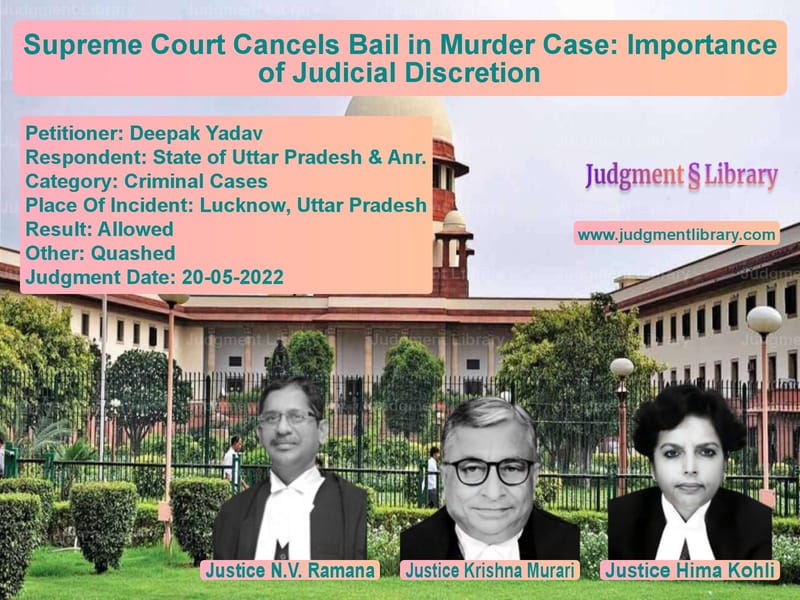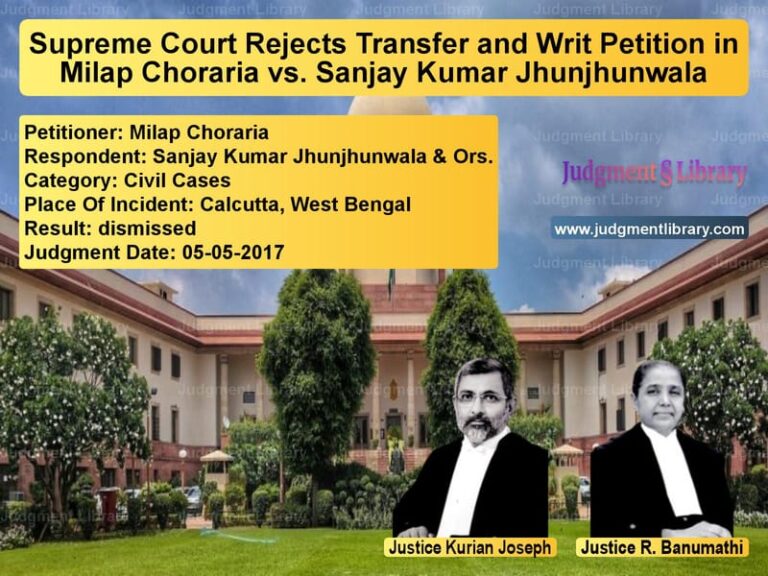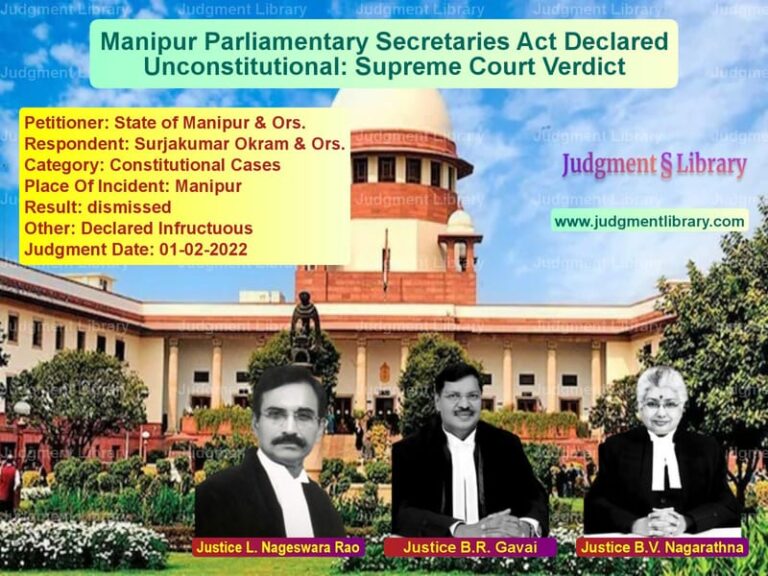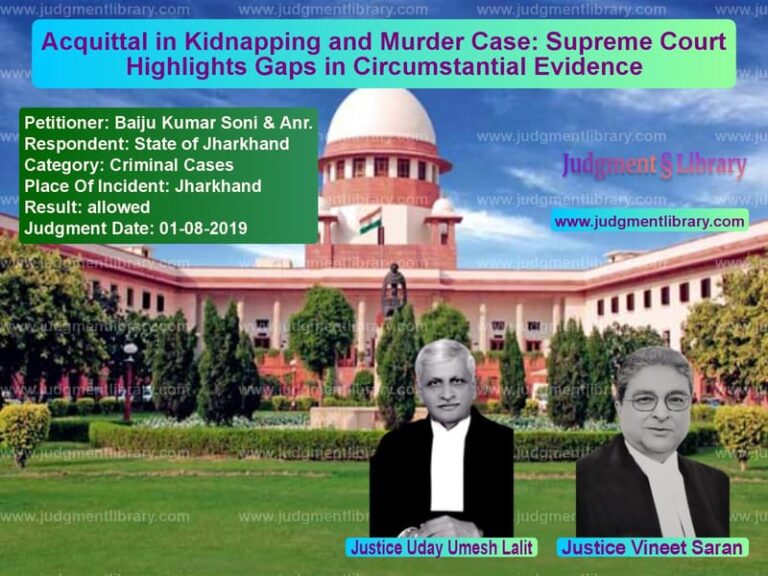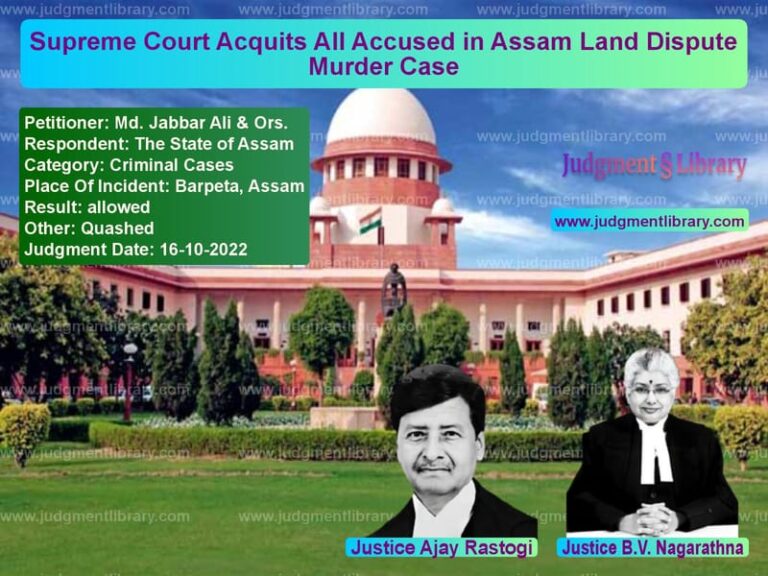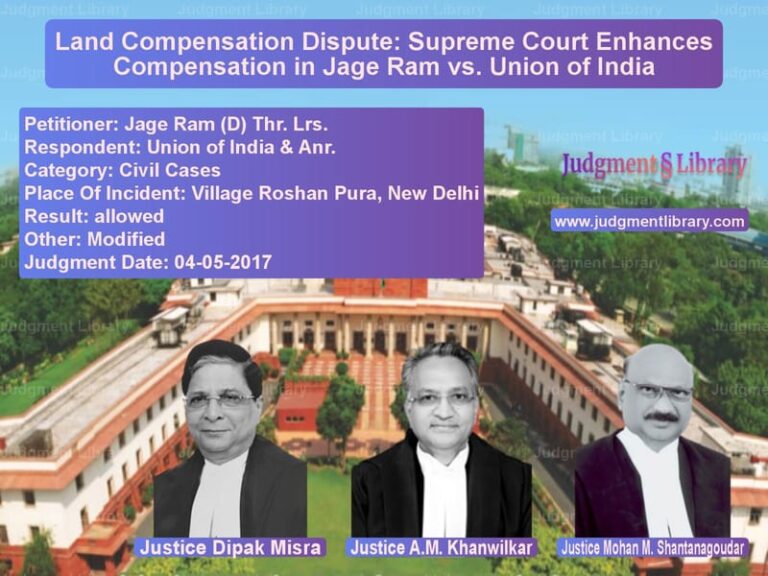Supreme Court Cancels Bail in Murder Case: Importance of Judicial Discretion
The Supreme Court of India recently delivered a crucial ruling in the case of Deepak Yadav vs. State of Uttar Pradesh & Anr., emphasizing the necessity of judicial discretion in granting bail in serious criminal cases. The Court overturned the bail granted to the accused by the Allahabad High Court, holding that the High Court had granted bail without proper consideration of the evidence and the gravity of the offense.
This ruling underscores the importance of evaluating all relevant factors before granting bail, particularly in cases involving heinous crimes such as murder. The judgment sets a precedent for ensuring that bail decisions are made judiciously and not merely as a matter of procedural formality.
Background of the Case
The case arose from the murder of Virendra Yadav, father of the appellant, Deepak Yadav. The incident occurred on January 8, 2021, when Virendra Yadav was shot near Jaipuria School, Lucknow, by a group of individuals. The victim was critically injured and succumbed to his injuries on January 14, 2021. An FIR was lodged at PS Para, Lucknow, under Section 302 and 34 of the Indian Penal Code (IPC), naming the accused, Harjeet Yadav and Sushil Kumar Yadav, along with two unidentified persons.
Read also: https://judgmentlibrary.com/murder-conviction-reduced-to-culpable-homicide-a-legal-analysis/
The accused, Harjeet Yadav, was arrested on January 13, 2021, and a country-made pistol with live cartridges was recovered from him. The co-accused, Sushil Kumar Yadav, surrendered before the Magistrate on January 16, 2021. A charge sheet was filed against both accused on April 6, 2021, and the case proceeded to trial.
While the Sessions Court rejected the bail application of the accused, Harjeet Yadav, on June 28, 2021, he subsequently approached the Allahabad High Court for bail. The High Court, on October 22, 2021, granted bail to him, citing the principle of parity since the co-accused, Sushil Kumar Yadav, had already been granted bail.
Challenging the High Court’s order, the victim’s son, Deepak Yadav, filed an appeal before the Supreme Court.
Key Legal Issues Before the Supreme Court
- Whether the High Court had erred in granting bail to the accused based on parity.
- Whether the nature of the crime and evidence should have been considered more thoroughly before granting bail.
- What constitutes a valid judicial exercise of discretion in bail matters?
- Whether the High Court had failed to protect the interest of the victim’s family.
Arguments Presented
Petitioner’s (Deepak Yadav) Arguments
- The accused was directly named in the FIR and was identified by the victim himself before his death.
- The High Court granted bail on the first day of hearing without allowing the State or the victim’s family to present their objections.
- The accused had a criminal history and was likely to tamper with evidence and threaten witnesses if released.
- The recovery of the firearm from the accused confirmed his involvement in the murder.
Respondent’s (Harjeet Yadav) Arguments
- The accused was a student with no prior criminal record, and the charges were fabricated.
- The co-accused, Sushil Kumar Yadav, had already been granted bail, making him entitled to bail on the ground of parity.
- There was no direct evidence linking him to the murder other than the dying declaration of the victim.
- Granting bail does not automatically prejudice the case, as he would attend the trial and cooperate with the investigation.
Supreme Court’s Observations and Ruling
1. High Court Failed to Consider Relevant Factors
The Supreme Court found that the High Court had granted bail without considering the gravity of the offense and the role of the accused. It stated:
“The High Court has granted bail without examining the nature of the allegations, severity of the crime, and the potential threat to witnesses.”
2. Bail Cannot Be Granted Merely on the Basis of Parity
The Court emphasized that parity alone cannot be the sole ground for granting bail. It noted:
“Granting bail on the basis of parity ignores the fact that different accused may have different levels of involvement and culpability in the crime.”
3. The Victim’s Statement Was Crucial
The Supreme Court held that the dying declaration of the victim, who specifically named the accused, was significant evidence that could not be ignored:
“A dying declaration carries strong evidentiary value and cannot be disregarded at the stage of bail.”
4. Accused Poses a Threat to Justice
The Court noted that the accused’s criminal history and influence could endanger witnesses:
“There exists a real and substantial likelihood that the accused, if released, will tamper with evidence or threaten witnesses.”
5. Bail Order Set Aside
The Supreme Court canceled the bail granted by the High Court and directed the accused to surrender within one week. It ruled:
“The order of the High Court granting bail to the accused is hereby set aside, and the accused is directed to surrender before the authorities within one week.”
Impact of the Judgment
This ruling has significant implications for the judicial process in granting bail.
1. Reinforcing Judicial Discretion in Bail Cases
The judgment reaffirms that bail decisions must be based on a thorough evaluation of the crime, evidence, and potential risks.
2. Preventing Misuse of Parity in Bail Decisions
The ruling clarifies that parity cannot override the merits of each case and should not be used to grant bail automatically.
3. Strengthening the Rights of Victims
The Supreme Court’s intervention ensures that victims and their families have a voice in bail proceedings.
4. Discouraging Casual Bail Grants
The judgment warns lower courts against granting bail without proper consideration of the severity of the offense.
Conclusion
The Supreme Court’s ruling in Deepak Yadav vs. State of Uttar Pradesh & Anr. is a landmark decision that strengthens judicial discretion in bail cases. By overturning the High Court’s bail order, the Court has reinforced the need for careful assessment of the gravity of offenses before granting bail. This judgment serves as a crucial precedent for ensuring that justice is served fairly and that accused persons are not released without adequate scrutiny.
Petitioner Name: Deepak Yadav.Respondent Name: State of Uttar Pradesh & Anr..Judgment By: Justice N.V. Ramana, Justice Krishna Murari, Justice Hima Kohli.Place Of Incident: Lucknow, Uttar Pradesh.Judgment Date: 20-05-2022.
Don’t miss out on the full details! Download the complete judgment in PDF format below and gain valuable insights instantly!
Download Judgment: deepak-yadav-vs-state-of-uttar-prade-supreme-court-of-india-judgment-dated-20-05-2022.pdf
Directly Download Judgment: Directly download this Judgment
See all petitions in Bail and Anticipatory Bail
See all petitions in Judgment by N.V. Ramana
See all petitions in Judgment by Krishna Murari
See all petitions in Judgment by Hima Kohli
See all petitions in allowed
See all petitions in Quashed
See all petitions in supreme court of India judgments May 2022
See all petitions in 2022 judgments
See all posts in Criminal Cases Category
See all allowed petitions in Criminal Cases Category
See all Dismissed petitions in Criminal Cases Category
See all partially allowed petitions in Criminal Cases Category

